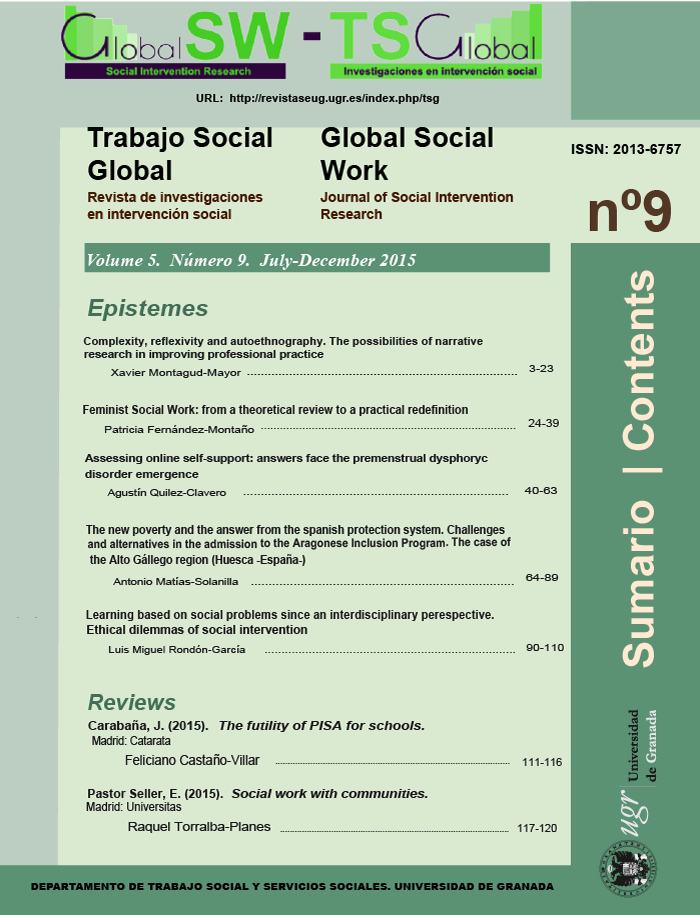LEARNING BASED ON SOCIAL PROBLEMS FROM AN INTERDISCIPLINARY PERSPECTIVE: ETHICAL DILEMMAS OF SOCIAL INTERVENTION
DOI:
https://doi.org/10.30827/tsg-gsw.v5i9.3582Keywords:
Aprendizaje de casos, Práctica social, Interdisciplinariedad, Trabajo Social, Metodología., Learning Work Practice Social-case, social Interdisciplinariedad, MethodologyAbstract
This article is inspired by an innovative educational project developed at the University of Malaga (Spain) during 2013-2015. Complies with the requirements of the European Higher Education Area, concerning the acquisition of systemic, instrumental and interpersonal skills, an innovative learning experience, inspired by the need for feedback from the social sciences and socialization of knowledge, is proposed from the perspective of the common curriculum. Its main purpose is aimed at ensuring optimum results about learning in Social Work degree in related social disciplines, from a common and creative epistemology. The results have enabled the production of a didactic approach consisting of problem situations, the partner from practice materials. This information has been provided by the professionals involved empirically in practice, in order to generate educational resources, educational and social to scientific knowledge production tools. Welfare cases have been analyzed from all disciplinary perspectives or social sciences related to social work and disseminated for faculty, professional and academic use.
Downloads
References
Banks, S. (1997). Ética y valores en trabajo social. Barcelona: Paidós
Bermejo, F. (2002) Ética de las profesiones. Bilbao: Desclée de Brouwer.
Consejo General del Trabajo Social (2012). Código Deontológico del Trabajo Social.
Cordero, N. (2013). Repensando la formación ética en Trabajo Social: Razones, fundamentos y experiencias. En Rondón, L.M. y Taboada, M (comps). Voces para la ética del Trabajo Social en tiempos trémulos. Madrid: Paraninfo.
Cortina, A. (2005) Ciudadanos del mundo. Madrid: Alianza.
Díaz, F. (2005). Enseñanza situada: Vínculo entre la escuela y la vida. México: McGraw Hill.
Freire, J. y Brunet K. (2010). Políticas y prácticas para la construcción de una Universidad Digital. La Cuestión Universitaria. Boletín Electrónico de la Cátedra UNESCO de Gestión y Política Universitaria. Universidad Politécnica de Madrid. Recuperado de: http://karlabru.net/site/publicacoes/poli%CC%81ticas-universidad-digital/ [15/09/2015]
Jonassen, D. (2000) El Diseño de entornos constructivistas de aprendizaje En: Reigeluth, Ch. (comps) Diseño de la instrucción Teorías y modelos. Un paradigma de la teoría de la instrucción. Parte I. Madrid: Aula XXI Santillana. Recuperado de: http://especializacion.una.edu.ve/teoriasaprendizaje/paginas/Lecturas/Unidad%203/jonassen.pdf [10/09/2015]
Kolodner, J. y Guzdial, M. (2000). Theory and practice of case-based learning aids. En D. Jonassen y S. Land (Comps.), Theoretical Foundations of Learning Environments. Mahwah, Nueva Jersey: Lawrence Erlbaum.
Pozuelos Estrada, F.J., Rodríguez Miranda, F.P. y Travé González, G. (2012). Un enfoque interdisciplinar en la Esneñanza universitaria y el aprendizaje basado en la investigación. Un estudio de caso en el marco de la formación. Revista de Educación, 357, enero-abril 2012, pp. 561-585.
Reamer, F. G. (1990). Ethical Dilemmas in Social Service, New York: Columbia University Press.
Rondón, L.M. (2012) Bases para la mediación familiar. Valencia: Tirant lo Blanch.
Rondón, L.M. y Taboada, M. (2013) (comps.). Voces para la ética del Trabajo Social en tiempos trémulos. Madrid: Paraninfo.
Salcedo, D. (2006). La ética del Trabajo Social en la época posmoderna. En Fernández, T. y Alemán, C. (comps). Introducción al Trabajo Social. Madrid: Alianza
Tapscott, D. (2009) La era digital. Cómo la generación net está transformando al mundo. México: McGrawHill.
Vaquer Caballería (2002). La acción social. Valencia: Tirant lo Blanch.
Downloads
Published
How to Cite
Issue
Section
License
Authors publishing in this journal agree to the following terms:
- Authors retain their copyright. They guarantee to this journal the right to a first publication of the work submitted to initiate the editorial process.
- Authors know that their work is published under a Creative Commons License which allows others to share it, with a recognition of the work's authorship and its initial publication in this journal.
- Authors share with Global Social Work explotation rights of the work that has been published in this journal, authorizing the execution of a free reproduction, distribution and public communication. Authors know that their work will be stored on servers and reproduced in digital format for inclusion in institutional repositories and databases that will facilitates free access to the full text of the work.
- Authors may distribute the version of the work published in this journal (for example, to an institutional repository or publish it in a book), with the explicit acknowledgment of its initial publication in this journal.
Copyright on the texts published in Trabajo Social Global -Global Social Work, as well as editorial policy of the journal refering to self-file and deposit in institutional or thematic repositories, are identified in the database





















